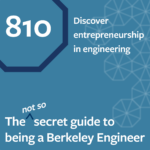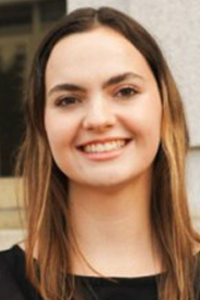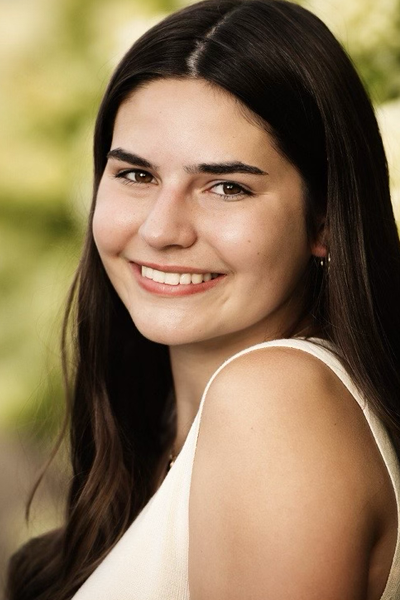ESS 810: Discover entrepreneurship in engineering

Are you interested in someday making the leap from student to entrepreneur? This week, we are learning about the Sutardja Center for Entrepreneurship and Technology and its Student Innovation Fellows program. Engineering students Rachel Eizner and Claire Holland will give us pointers on signing up to be a fellow and ways you can engage with this program to grow your entrepreneurial mindset.
Important links from this week’s episode:


Laura Vogt:
Hello and welcome to The (Not So) Secret Guide to Being a Berkeley Engineer. I’m your host, Laura Vogt. I’m Associate Director of Marketing and Communications in the College of Engineering.
As students learn more about engineering and what they’ll be doing after graduation, one of the words that I’ll hear often is entrepreneurship and UC Berkeley has numerous ways for students to learn about being entrepreneurs, including the Sutardja Center for Entrepreneurship and Technology. I’m going to trip over that word this entire podcast. It’s a big … but it’s also known as SCET. And today we’re going to learn about a twelve-week co-curricular program from SCET that will teach entrepreneurship skills to current students, the SCET Student Innovation Fellows. And this challenge-based program is open to any student on campus. And I’m excited to have current Berkeley engineering students, Rachel Eizner and Claire Holland, on the podcast today to share the program details.
Hi Rachel and Claire. Thank you so much for being on the podcast today. Can you tell us about yourself and your role with Student Innovation Fellows?
Rachel Eizner:
Yeah. Hi Laura. Thanks for having us. So I’m Rachel. I am going to be a senior, so class of 2025, and I study Industrial Engineering and Operations Research, and I am a Innovation Fellows Program lead at the Sutarjda Center.
Claire Holland:
Hi everyone. My name is Claire. I’m a rising junior and I’m a civil engineering major. And then I’m the same role as Rachel, so a fellow lead in the program.
Laura Vogt:
Well, thank you both so much for being here today. So let’s start off with the base of the program, which is the Sutarjda Center for Entrepreneurship and Technology. Can you tell us about that?
Rachel Eizner:
Yeah. So the Sutarjda Center is basically the best place for entrepreneurship on campus. I’m a bit biased, but I do think it’s true. It started in 2005 teaching one course just to provide some sort of entrepreneurship to campus. And now, there are over 20 courses each semester. About 2,000 students participate in our classes and programs and over 80 majors are represented in these courses. So people from all across campus can take classes at the SCET about entrepreneurship.
There are classes, there are events, there are speaker theories, there are mixers. We also have a Certificate in Entrepreneurship. So if you take a certain number of classes through the SCET, you can get that certificate. And we also offer a super exciting summer abroad program where you get to network with a bunch of other international students who are interested in entrepreneurship in Portugal and in Spain. The places might change over the next few summers, but people describe it as life-changing. So I definitely recommend looking into it. The SCET basically just hosts everything to do with entrepreneurship on campus, and it’s a super great opportunity for students looking to dive into that.
Laura Vogt:
And the best way to start looking it up is on their website, right?
Rachel Eizner:
Yeah. Super easy to find. We have a great SEO.
Laura Vogt:
And it’s scet.berkeley.edu?
Rachel Eizner:
Yes.
Laura Vogt:
And, as Berkeley engineering students, why is entrepreneurship important to you?
Claire Holland:
I think in classes we learn a lot of theoretical concepts and technical skills, but Berkeley is really fast-paced. We’re learning a lot of information very quickly, so there’s not really time to apply these knowledge and skills. And then when a lot of students go to industry, I feel like sometimes it can be hard to pick up on what’s actually going on because it is such a different universe and different vocabulary. So I think the program is extremely important for developing solutions and understanding the markets that you’re going to be involved in, just from a networking point of view or also just learning about the different vocabulary that they use in the real world.
Laura Vogt:
I feel like learning about entrepreneurship also has to teach you how to speak about what you’re passionate about.
Claire Holland:
Oh, a hundred percent. And also, just understanding what you are passionate about in the first place. Because I know, when I went into freshman year, I didn’t even know what major I wanted to do. And being involved in this program has really taught me the different avenues of just my major specifically but then also all the different spaces I can go into.
Laura Vogt:
Actually, I’m really glad that you said that. We just did a podcast last week talking about what if you’re not sure if the major you’re in is right for your interests. So I like the idea that doing something like this is going to even expand your knowledge of what you can do with your major and what you’re studying.
Claire Holland:
Oh, a hundred percent.
Rachel Eizner:
Yeah. Also, just to jump in here, the program is really great at getting hands-on learning. A lot of our classes are project-based which means you’re not learning, “Oh, this is what entrepreneurship means and looks like in different places” from a textbook or from lecture slides. You’re working on a semester-long project where you’re with a team in different formats to actually create something. And I think that’s a much better way of learning than sitting in a classroom.
Laura Vogt:
That’s awesome. So let’s talk more about the specific program that both of you work with, the Student Innovation Fellows. So what is it and how do students get involved?
Rachel Eizner:
So it’s basically a 12-week long program, but I like to think of it as a 12=week long game. It’s an option for students who don’t really have time to take a class or want more flexibility in their schedule to push themselves outside of their comfort zone and grow by trying new entrepreneurial experiences. So it’s basically a series of games that students can opt into. You can participate as much or as little as you want. And, of course, with all games we have some pretty awesome prizes.
Laura Vogt:
How does the game support students who want to learn more about being entrepreneurs?
Claire Holland:
I would say there are two main ways. The first, the networking that you get along the way. Not only can you talk to students that are like-minded or in similar spaces and with similar goals and ambitions, you also get to network with Berkeley alumni and successful entrepreneurs who have already been in those spaces and have experienced those challenges of startups and post-grad life.
And then, also you’re getting those skills-based challenges like Rachel mentioned previously. So you’re learning those communication skills, the processes for creating your own company, the business procedures, stuff that is kind of touched on in classes but it’s really good to have experience even before you start an internship or get involved in the industry.
Laura Vogt:
And we’re saying it’s available for any Berkeley student. That means undergrad, grad-
Rachel Eizner:
Yes.
Laura Vogt:
… anyone. Is it mostly undergrads or do you have a lot of grad students that participate too?
Rachel Eizner:
We do have a lot of undergraduate students, but you’d be surprised at our graduate student population. We have a lot of MBA students, plus one master’s who did the program in their undergrad engineering and then wanted to continue next year in their master’s. A lot of design students, design master students at Jacob, so really all across the board. Any college that you can think of or type of major, we probably have a couple students participating.
Laura Vogt:
And how many challenges do you have that are offered throughout the 12 weeks?
Claire Holland:
It really depends on the year, but there’s typically around 20 to 25 that spread out through the 12 weeks. And, like Rachel mentioned, they’re very as you please. You can participate as many or as little as you want, which is what’s so great because if you’re having a really busy week with courses, you don’t have to participate that week.
Laura Vogt:
And what’s the time commitment then to actually do any of those challenges?
Rachel Eizner:
Yeah, it varies-
Claire Holland:
It’s very-
Rachel Eizner:
Oh, sorry. [inaudible 00:07:48].
Claire Holland:
No, you go, Rachel. You can go.
Rachel Eizner:
It varies. It’s very flexible. So some take around 30 minutes to complete, some six hours or more. It’s as much time as you want to put in, but each challenge and each game has points associated with it that you can win. So if you want the points and you want the prize, putting in more time can be beneficial.
Laura Vogt:
And are there opportunities for students to network with each other and the alumni? You had said earlier that they do get to meet with the alumni.
Claire Holland:
So a lot of the events are collaboration focused, so they’ll have the small groups and reflection activities among the students participating. And then we have specific networking events and panels with past alumni. So those are the main focus to get connections and network. And then, at the end of the program, we also invite our top winners to an event with past winners and SCET alumni specifically. So you have the alumni participating in the events themselves, some as panelists, some as participants. And then, you also get the connections. If you meet someone, you can emails and talk to them through that. So it is very networking and alumni focus. So we see them kind of everywhere in the program.
Laura Vogt:
And is this something that you’re doing as an individual or are you working with a group?
Rachel Eizner:
The beauty of the program is we have both. So some students engage in challenges alone. Some challenges are intentional to be group based, so some students come with a partner, but we also really encourage meeting people in the program. So if we have a group challenge, we’ve had a lot of groups that meet each other through the challenge, through Slack channels or through us assigning partners, and they form pretty good teams and they work on stuff after that. So if it’s a time commitment thing, alone is definitely an option. But I definitely encourage people to meet others in the program and make connections and work together and figure stuff out. I think it makes it way more fun.
Laura Vogt:
Have either of you ever had experience with the program where it showed someone really coming into their own in that world of entrepreneurship where you were like, “Ah, this is exactly what we wanted to do?”
Claire Holland:
Yeah, I can talk about this because this is honestly my favorite question. So I led a sandwich-making contest event similar to Chopped or all those cooking shows on TV, and it was with a company, Prime Roots. It’s a plant-based deli company that was founded out of UC Berkeley’s Alt Meat Lab, which participation in that lab can help get the SCET entrepreneurship certificate. So it is SCET based. So they were our main partner for the event and they talked about getting their company going and their process coming from the Alt Meat Lab and getting SCET funding and becoming an actual company in the real world.
So it was great just to see how they became from students to actual industry workers and building up their company from the scratch, not only their product and all the science that went behind it, but then also learning the business behind making your own company. And they were recently featured in the Netflix documentary, You Are What You Eat, a Twin Experiment. So it’s just been great seeing that broadcast and that reach, go all the way to Netflix. So it has been great working with them and they’re just really great people. So I loved that experience.
Laura Vogt:
That sounds like a fun event to be able to be part of, to get to know someone where it’s not necessarily just a panel, but you’re getting to challenge yourself and talk to them as you do it.
Claire Holland:
Oh yeah. They’re all super fun our networking challenges because they normally have an active component to it. So for this, we’re building sandwiches and we got to try the different meats. And for me, I’m a picky eater, so it was really cool trying all these different flavors and they got really creative with it which is fun.
Laura Vogt:
And are the two of you the ones that come up with all the challenges?
Claire Holland:
So there is a whole team of us. There’s a couple other people that work with marketing, and there’s also another fellow lead, and then we obviously have our boss, but it’s mostly students that are helping create these ideas, which I think is really cool because we are the ones that are also participating in it. So we kind of get to do fun things that we know college students would really enjoy.
Laura Vogt:
That peer-to-peer aspect of it I think is really important because I’m too old now to understand everything.
Claire Holland:
No, yeah, and fun for us too. I mean, it’s a great job.
Laura Vogt:
Is there anything we haven’t talked about the program that you want to add?
Rachel Eizner:
Yeah, I just want to emphasize that it’s really for everybody. Our challenges are quite accessible. A lot of people have never even touched entrepreneurship or heard of entrepreneurship before, they’ve participated in the program. And the challenges are really meant to get you that experience. So nothing to be scared of. And also the prizes this semester for fall are very good. I can’t say what they are, but I definitely recommend participating as I’m very excited about what we have in store.
Laura Vogt:
So let’s go over some details. How are we going to learn more? What are important dates that the students should know and where should they go if they have questions?
Claire Holland:
So registration begins the first couple of weeks of school, and the best way to find out information and to actually register in the program is going on our website because we’ll have a Slack where we’ll announce when the program starts and when upcoming events happen as well as a newsletter. So make sure you get involved with that. And then also on the website there’s contact details if you have more specific questions about the program or how to get involved.
Laura Vogt:
And I’ll make sure that we have it in the ESS newsletter too.
Claire Holland:
Perfect.
Laura Vogt:
Thank you both so much for being here today on the podcast. But before you go, I just want to know, do you have any tips for any of our incoming students?
Rachel Eizner:
Yeah. I think with engineering it’s very easy to get caught up in, “I have to take this class and I have to do this and I want to be this type of engineer and I need to be hitting this number of units.” But it’s really a really well-built out program, engineering at Berkeley and also entrepreneurship at Berkeley. There’s so many resources and so many ways to get involved in a way that’s really fun and engaging. So I really recommend just, it’s easier said than done, but having fun with it. I mean, remember why you like building, why you’re doing engineering in the first place, and try to reignite that spark sometimes when it gets a little more difficult.
Claire Holland:
Yeah, just kind of going off of that, I think my biggest thing is just explore what you want to do, get involved with fun clubs, get involved with everything you possibly can, the entrepreneurship program too. Just anything because I know going in, I’ve changed my major, I think, two different times. I’ve added multiple minors. One I’m not even doing anymore and this is the time and the place to be doing that. Just explore what you want to do. Create companies that are going to fail. Just have a really good time with it because when you get around to the real world, it’s a little harder to pivot. So yeah, have fun with it and enjoy your time.
Laura Vogt:
I feel like in college you could learn a lot from your failures just as much as you learn from your successes. So it’s not a bad thing if something doesn’t work.
Claire Holland:
Right. Oh, a hundred percent.
Laura Vogt:
Well, again, thank you so much for sharing information about the SCET and the Student Innovation Fellows, as well as your tips for our new students. And thank you, everyone, for tuning into The (Not So) Secret Guide to Being a Berkeley Engineer. We’ll be back next week with more information and resources for your time as a Berkeley engineer. Thank you.